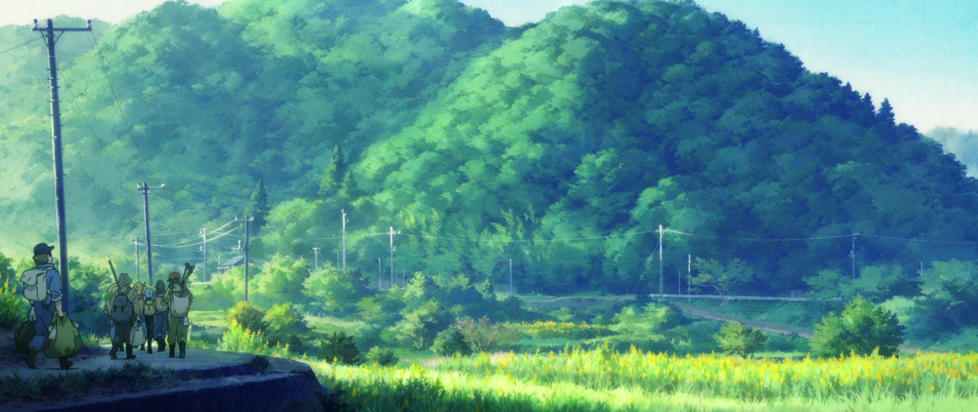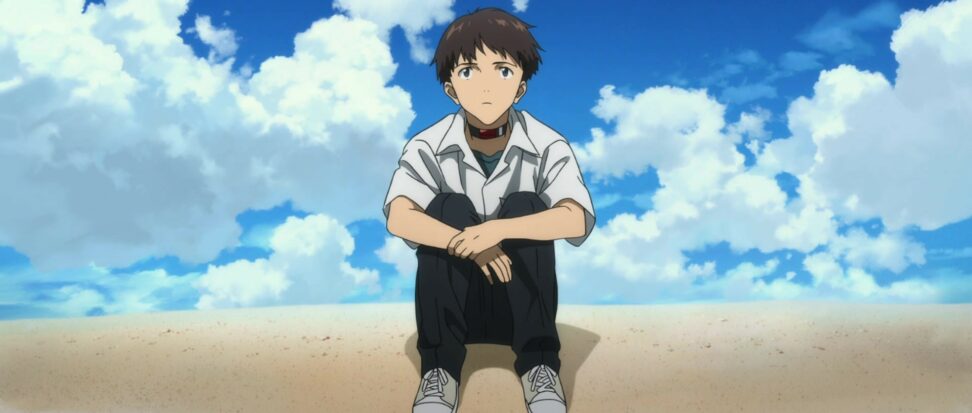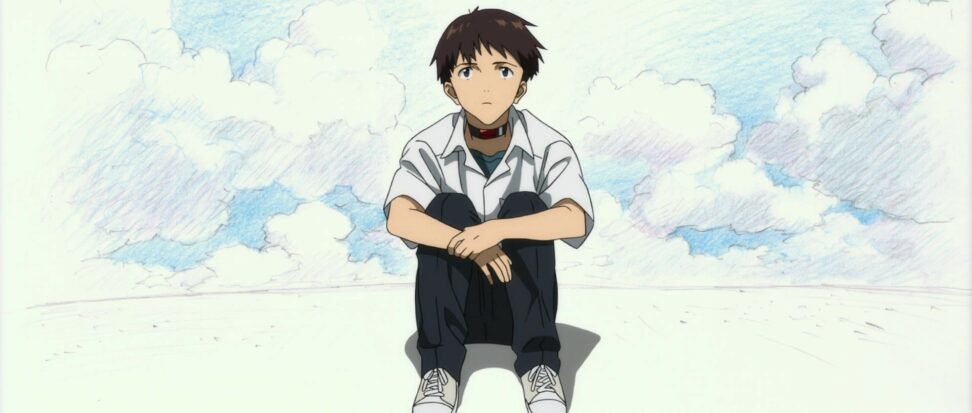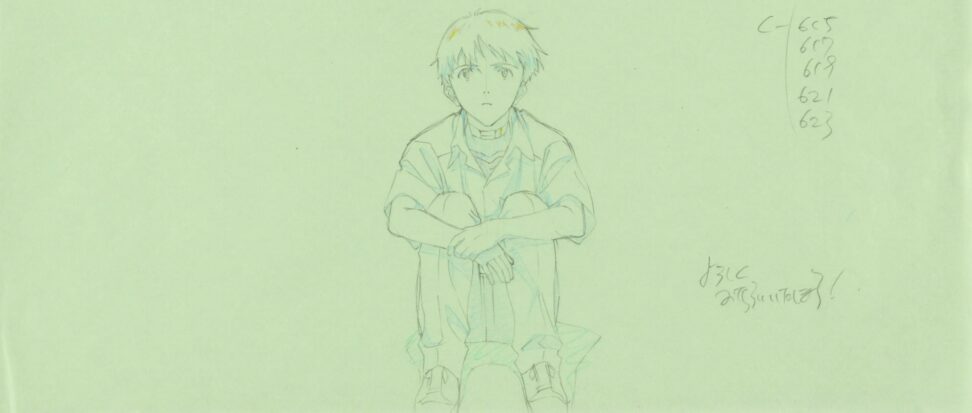
It Takes a Village

This column is a reprint from Unwinnable Monthly #143. If you like what you see, grab the magazine for less than ten dollars, or subscribe and get all future magazines for half price.
———
Reframing the boundaries of what is seen and unseen…
———
End of Evangelion was my introduction to Neon Genesis Evangelion. My friend Noble and I caught a clip of the pilot on Toonami during “Giant Robot Week” in the early 2000s and were so amazed by the design of Unit 01 that we had to track it down. In the dimly lit confines of our local Suncoast, we scurried across their carpeted floor searching for anything related to the anime. We left with two DVDs. Noble took home the compilation film Neon Genesis Evangelion: Death & Rebirth, and I was left with End of Evangelion.
In a way, I find it fitting that my connection to this show which is so tied to “endings” started with one of its most defining iterations.
But I was just a kid then, no more than nine or ten and, despite the title giving it away, it didn’t really register that I was watching the cataclysmic ending of one of the most hailed mecha anime of all time. To me, it was a film that was weird, brutal and starred a protagonist that didn’t really want to do much of anything. I didn’t understand the film at all, but I did relate to that aspect.
I felt a kinship to Shinji’s malaise, which probably had more to do with growing up Black and mostly alone in the suburbs, than any world-altering event weighing on my shoulders. Whatever the case may be, I watched End of on repeat, wondering what the hell was up with this character Shinji who everyone seemed to love and hate all at once.
In the subsequent years that followed, Neon Genesis Evangelion would become a defining work of fiction for me. It coupled my love of giant robots and science fiction, with themes of mental illness, loneliness, anger and anxiety that I didn’t quite have the vocabulary to articulate on my own yet.
* * *
When Hideaki Anno, creator of Evangelion, began releasing the Rebuild of Evangelion movies, I had a sneaking suspicion that things would be different. I’d stay up late reading fan theories about how it was actually a sequel instead of a remake, an “and then…” instead of an “actually.”
After the first film, it became apparent that whatever the continuity of this project was, Rebuild was interested in exploring similar themes from a new lens. One that was more interested in the rehabilitative, but challenging act of trying. What became forefronted in Shinji’s journey this time around wasn’t the mysterious machinations of his father and NERV. Instead, it lingered on why fostering real connections and community through open and honest communication is important.
And with the release of Evangelion 3.0 + 1.0 Thrice Upon a Time, a film I’ve been waiting over thirteen years for, I kept hearing rumblings that, this time, there would be a happy ending.
My initial reaction to this was: what the hell could that mean? What could a “happy ending” look like in the world of Evangelion? And how could that come about for the troubled characters Anno has grappled with for decades?
The answer, in part, is that for Shinji to advance, it will take a village.
* * *
Coming to Washington was a life-altering decision for me. I moved far away from my friends and family in the Midwest and East Coast to a place I’d only been to in passing. Over the two years, I’d lived in Seattle at this point, however, I rebuilt a sense of community that was beginning to feel like home.

When Seattle went into lockdown in March of 2020 as the COVID-19 pandemic swept across the globe, I was on the precipice of finishing my MFA in Prose Writing. Like all of us, the normal life I lived was over. I lost real contact with many of my friends in the city and it felt like most of my community packed up and left in the middle of the night back to where they came from – to places I’ve never been and probably never will go. Since then, I’ve had to remind myself that when something breaks, not all is lost. In fact, there is an opportunity to see the pieces that formed me anew.
This sentiment is reflected in the most surprising element of 3.0 + 1.0: the introduction of Village 3. Comprised of people who’ve survived Near Third Impact (N3I), Village 3 represents a community that has banded together to rebuild a sense of normalcy in the sanguine-stained world they live in now. But instead of presenting us with a post-apocalyptic community governed by paranoia, fear and power, Anno imagines something quieter, ruminative and more of the Earth than Evangelion has ever been.
Recently, Autumn Wright, wrote briefly about this difference in her piece for We Got This Covered stating, “In Village 3, they [the survivors] see that there is agency in what is left.”
Through the eyes of a Rei Ayanami – who is not Rei Ayanami – Anno presents a new vision of what life can be after a terrible decision. A key lesson that Rei (and later Shinji) must learn during her time in Village 3 is that she is more than what the world tells her she is. This is illuminated beautifully in her interactions with the matriarchal farmers who take Rei under their wing and teach her the value of “work” which is presented as interpersonal labor as much as it is manual.
Through these womens’ insights, Rei begins to understand the value in looking beyond what the world orders her to do, and that simply trying is a revolutionary act in and of itself. She puts this into praxis as she endlessly reaches out to Shinji with her new perspectives, finally connecting with him at last before her time is up.

Evangelion has always been interested in cycles, in unpacking oneself through the looping of experience. The distinction made this time around is that ‘trying” is an act that exists within an elsewhere, a liminal place where one’s true self can be found. When the outcome is removed from the equation, the simple act of attempting can set us free.
The “Rebuild” films seem to be more interested in the aftermath of a major decision, instead of the decision itself. How do our own failings, success and inactions not only affect us but also our community? How do we go on after we’ve been hurt? And most importantly, how do we move forward after we’ve hurt others?
3.0 + 1.0’s answers are often simple ones, rebuilding what has been broken is only possible if you try, and trying is much easier when you connect with other people who support you. This isn’t a revolutionary thesis, in fact, it’s fairly ordinary: connecting with others makes life worth living, no matter how hard it is. But I’m struck by the plainness of this rumination. Anno has reframed, redacted and re-envisioned the portrait he painted decades ago and revealed to us something new. Just as the EVAs, Angels and world itself are pulled away to reveal a soundstage filled with all the Tokusatsu set fixings, Anno whispers to us, “All of this? It’s beside the point. Look beyond that and what do you see?”
* * *
Now, over a year after this pandemic started, with my flimsy vaccination card collecting dust in my room, I’m relearning how to reach out to other people again.
Most days, I open text messages from friends asking to hang out and cringe a bit. So much of who I was before the world changed seems to be lost in “the before.” I mourn much of what was lost from my life in the last two years. I dread the repetition that permeates much of my life now. But despite all of that, I’ve also gained so much. I find myself looking for the silver lining in situations more, attempting to try things I wouldn’t have ever done in the past. I remind myself that nothing is ever really gone.

The past always finds a way to resurface in the present.
To talk about the ending of Evangelion feels to me like an insurmountable task. What I can say is Evangelion 3.0 + 1.0: Thrice Upon a Time came at the perfect moment for me. During a year where I must convince myself to not sequester away from those I love, this film was the antidote I needed. I’m continually drawn back to an insight Hikari gives Rei in Village 3:
“Life is a continuous cycle of tough times and good times. There’s nothing wrong if every day feels the same as today. That’s how it is. Right now is the youngest I’ll ever be. I want to live to the fullest right now.”
While some will call its hopeful message naive, or even navel-gazing, I don’t mind revealing in that sentimentality for a moment. I find pleasure in ruminating on the people from my own Village 3 who’ve helped remind me that I am so much more than I realize.
I’m reaching toward the life awaiting me just out of frame, why don’t you join me?
Good morning.
Good night.
Thank you.
Goodbye, all of Evangelion!

———
Phillip Russell is a Black writer and podcast producer. His writing explores the intersections between pop culture, Blackness, and our connection to land and identity. Follow his work on Twitter @3dsisqo.




